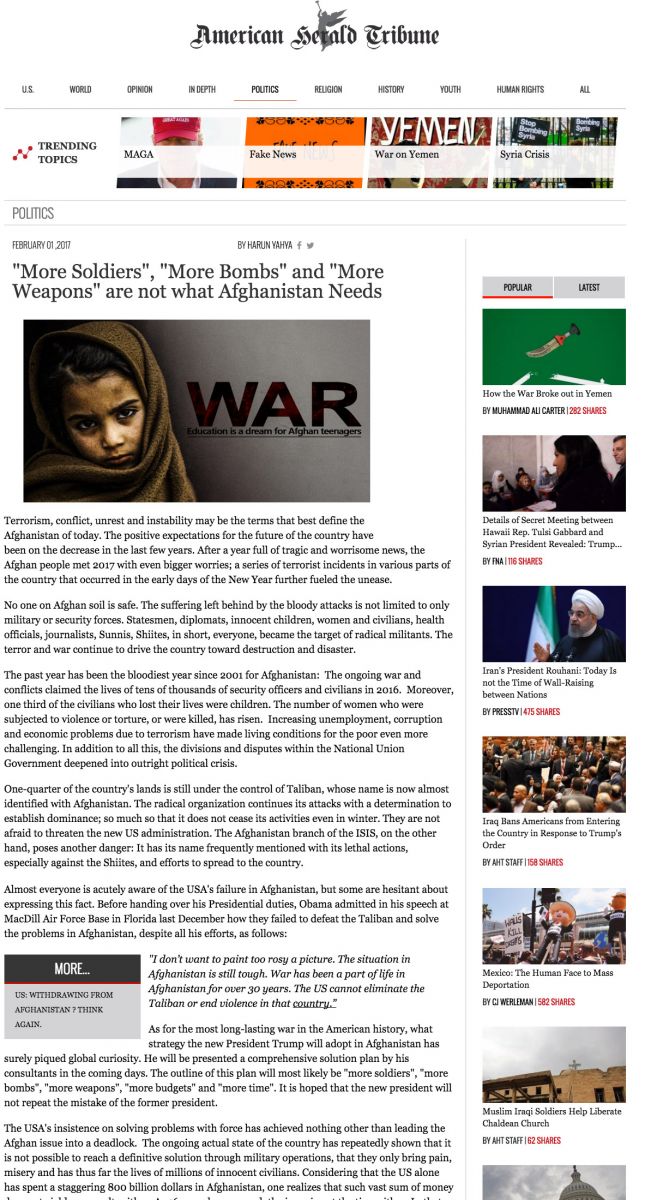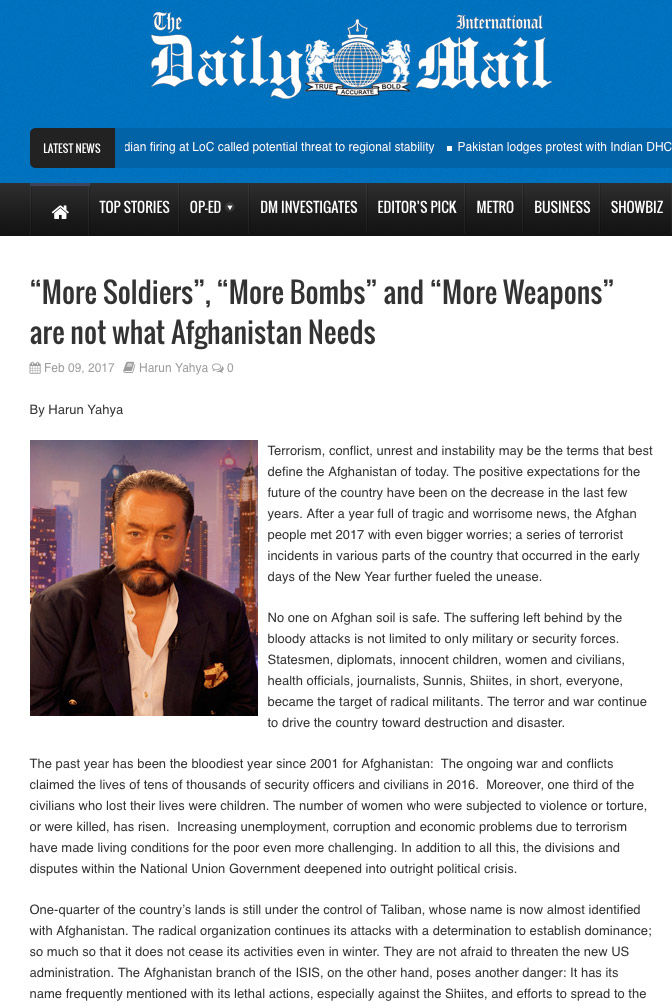
Terrorism, conflict, unrest and instability may be the terms that best define the Afghanistan of today. The positive expectations for the future of the country have been on the decrease in the last few years. After a year full of tragic and worrisome news, the Afghan people met 2017 with even bigger worries; a series of terrorist incidents in various parts of the country that occurred in the early days of the New Year further fueled the unease.
No one on Afghan soil is safe. The suffering left behind by the bloody attacks is not limited to only military or security forces. Statesmen, diplomats, innocent children, women and civilians, health officials, journalists, Sunnis, Shiites, in short, everyone, became the target of radical militants. The terror and war continue to drive the country toward destruction and disaster.
The past year has been the bloodiest year since 2001 for Afghanistan: The ongoing war and conflicts claimed the lives of tens of thousands of security officers and civilians in 2016. Moreover, one third of the civilians who lost their lives were children. The number of women who were subjected to violence or torture, or were killed, has risen. Increasing unemployment, corruption and economic problems due to terrorism have made living conditions for the poor even more challenging. In addition to all this, the divisions and disputes within the National Union Government deepened into outright political crisis.
One-quarter of the country's lands is still under the control of Taliban, whose name is now almost identified with Afghanistan. The radical organization continues its attacks with a determination to establish dominance; so much so that it does not cease its activities even in winter. They are not afraid to threaten the new US administration. The Afghanistan branch of the ISIS, on the other hand, poses another danger: It has its name frequently mentioned with its lethal actions, especially against the Shiites, and efforts to spread to the country.
Almost everyone is acutely aware of the USA's failure in Afghanistan, but some are hesitant about expressing this fact. Before handing over his Presidential duties, Obama admitted in his speech at MacDill Air Force Base in Florida last December how they failed to defeat the Taliban and solve the problems in Afghanistan, despite all his efforts, as follows:
"I don’t want to paint too rosy a picture. The situation in Afghanistan is still tough. War has been a part of life in Afghanistan for over 30 years. The US cannot eliminate the Taliban or end violence in that country.”
As for the most long-lasting war in the American history, what strategy the new President Trump will adopt in Afghanistan has surely piqued global curiosity. He will be presented a comprehensive solution plan by his consultants in the coming days. The outline of this plan will most likely be "more soldiers", "more bombs", "more weapons", "more budgets" and "more time". It is hoped that the new president will not repeat the mistake of the former president.
The USA's insistence on solving problems with force has achieved nothing other than leading the Afghan issue into a deadlock. The ongoing actual state of the country has repeatedly shown that it is not possible to reach a definitive solution through military operations, that they only bring pain, misery and has thus far the lives of millions of innocent civilians. Considering that the US alone has spent a staggering 800 billion dollars in Afghanistan, one realizes that such vast sum of money does not yield any results either. As 16 years have passed, the issue is not the time either. In that case, it is necessary to abandon the faulty strategies of the past as soon as possible and to turn to the methods that will yield results.
There has been a new development over the past few months that needs close attention: Russia, China, Pakistan and Iran coming together and becoming openly involved in the Afghan issue. There is the fact that if the countries mentioned here were to convene through diplomacy, reconciliation and love, a unique and huge step would be taken in resolving Afghanistan's deep-rooted problems.
Afghanistan is still home to a large number of terrorist organizations, major and minor. There are those that are at war with each other, and those that support each other. What they all tend to have in common is their radical ideology, for the sake of which they ruthlessly shed copious amounts of blood. The real and underlying problem is this radical ideology that has taken hold in the minds of the radical terrorists.
What needs to be done is to rectify the false beliefs in people's minds by preaching the true Islam instead of the bigotry that has emerged in the name of religion.The superstitions, false hadiths and bigoted beliefs that have no place in Islam are the primary cause of terror, violence and suffering that beset Afghanistan. This is not religion, but a radical and bigoted and exceedingly dangerous ideology masquerading as religion.
The Qur’an is the only cure for radicalism. That is why to achieve lasting peace, tranquility and prosperity, the actual strategy that should be pursued in the struggle against the Taliban - and other radical groups - is to educate them: Through an education free from the superstitions raised in the name of Islam, and the false beliefs and commandments in contradiction with the Qur'an; through an education that will take only the Qur'an as the guide.
Adnan Oktar's piece in American Herald Tribune & Daily Mail News:
http://ahtribune.com/politics/1489-afghanistan.html



